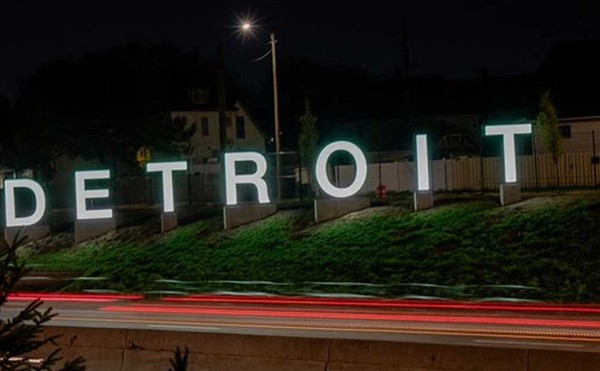Lights flashing red and white, an ambulance swerves on screen between the opening credits of Martin Scorsese’s Bringing Out the Dead (1999). Hot times, summer in the city: “All the elements were in place for a long weekend — heat, humidity, moonlight,” Nicolas Cage’s medic, Frank Pierce, informs us. He’s preaching to my choir.
I’ve worked weekend nights for Detroit EMS long enough to know that the phrase “idle hands are the devil’s workshop” is true. Turn up the heat and emergency-call volume goes up with the mercury. Many weekend-idled hands try to cool off wrapped around a 40-ounce (or two or three or more) and later, after dropping the last empty, may grip a blade, a gun — or the wheel of a car. Any one in the urban emergency biz will tell you that the worst weekends come on the demonic convergence of sticky heat, the first days of the month and the full moon, when some of the hot and bothered receive and cash their welfare checks, and buy a cheap chill from the local liquor store — or something stronger from the local drug house to just plain forget the heat. Soon the sirens are howling at the moon.
The howl of their siren dying, Frank and his partner, Larry (John Goodman), make the scene, and then it’s flashing lights, roll camera, action. It’s show time and, though the patient may be the best supporting actor, the medics are the stars, the last action heroes come to save the day to the sound track of human sorrow.
Frequently Asked Question: How do you do it? Good medics are either born with or achieve the ability to drop any distractions (the nightmare at hand), tune in to the problem and turn on the solution. Doubtful (knowing the probable outcome of resuscitating a man clinically dead for more than six minutes will be delivering him to his family as their new favorite vegetable), Frank still drops out, tunes in and turns it on, trucking his fresh produce to the nearest center for the suffering, a swamped urban ER aptly nicknamed Misery.
Many urban ER employees seem to see their hospitals as leaky ships foundering on a sea of human sewage, becoming arks of the dysfunctional. Drunks, junkies, crackheads, criminals and what looks like the guest list of “The Jerry Springer Show” congregate there two by two. Along with the flow of patients that some nurses selectively designate as “human beings,” they flood in faster than the staff can usually bail them out. We medics arrive at these zoos for the ill and injured as popular as a guy delivering seawater to the deck crew of the sinking Titanic. Some the nurses may refuse, but with guys like Burke (Cullen O. Johnson), newly resurrected Frankenstein-style by jolts of electricity and intravenous adrenaline, they can’t say no.
We’ve got other resurrections in our magical, medical box of tricks. For a heroin junkie like Frank’s goth kid, I. B. Bangin’ (Harper Simon), an injection of Narcan is a pharmaceutical angel-of-mercy-in-a-syringe slamming shut all the doors to the premature heaven the White Horse rides toward. Soon, most are up, cussing us out for blowing their high.
Of course, not all medics play the Narcan Resurrection with the satirical, “born again” rhetoric of Frank’s opportunistically Christian partner, Marcus (Ving Rhames). But Big Daddy Marcus is a type, part-Shaft gone to seed. He’s the black urban medic who thinks he’s a sex machine for all the chicks, a bad mutha-shut-yo’-mouth. But not as bad as Tom Walls (Tom Sizemore). Walls is the medic from hell, the borderline psycho who’s taken a lot more bullshit than he could stand — and taken it to heart. Now he blows off steam by playing sadistic street games like kick-the-crackhead. By contrast, Larry’s all meat and potatoes: He just wants to do the best job he can, have a decent meal and go home in one piece, the same way he came on.
Then there’s Frank. John Q. Medic might call a paramedic like Frank a “paragod.” It’s not a compliment. The paragod sees himself as Jesus in uniform, walking on sterile water, raising Lazaruses from the clinically dead. “You wonder if you’d become immortal,” Frank muses. “God has passed through you … for a moment there, God was you.”
But the problem is that owning up to saving lives is only one edge of a double-edged sword; the other edge is owning up to losing them. There is no joy in Mudville when the paragod strikes out. Lazarus dies and the water turns to blood, not wine. The boots of the emperor’s new messiah are filled with feet of clay. When a man who would be God falls to earth, he leaves a crater in his ego custom-fitted for his method of forgetting. For Frank, it’s the bottle. His only true salvation comes in letting go of the dead, his nightmares and his Frankenstein ambitions to rule over life and death.
We’re all part of something far greater, but it’s at least the seed to insanity to think we’re much more. We’re no gods — but, unlike the dead, we can do what we can. We can do the good we can.
James Keith La Croix writes about film for the Metro Times and works the streets for Detroit EMS. E-mail him at [email protected]




